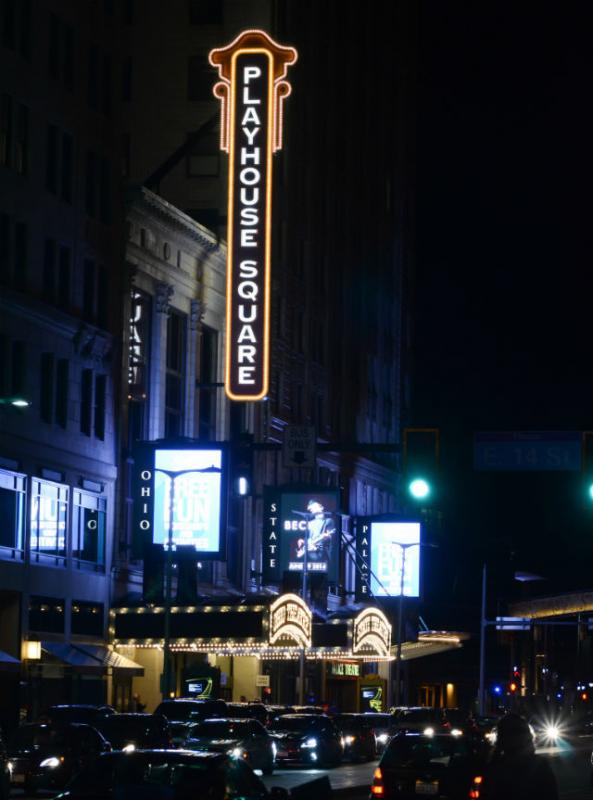Spotlight on Building Drama Programs, Building Communities

At a recent student matinee of A Christmas Story at the Cleveland Play House, two young girls clutched each other’s hands before the show started. Pamela DiPasquale, education director for Cleveland Play House, asked the girls if they were nervous. She recalls them asking, “‘Is it going to be scary? Is it going to get dark? What's going to happen?’ I talked them through it, but that wonderful joy of them being able to say ‘I've never done this before, but if I hold somebody's hand, I'll be ready for the ride.’”
The two girls were participants in Cleveland Play House’s Building Drama Programs, Building Communities program. Launched in 2014 and recently awarded an NEA Arts Education grant, this two-year initiative helps schools develop and sustain after-school drama programs, while simultaneously introducing students to the magic and benefits of theater. The grant will support Building Communities at six K-8 schools throughout Cleveland.
Without the program, there is a good chance the theater would remain a great unknown. According to Cleveland Play House, 100 percent of students from participating schools live in poverty, making theater tickets financially challenging if not outright impossible. In-school drama programs are not much more accessible. The 2013 report The Status of Arts Education in Ohio’s Public Schools: Findings and Recommendations found that only 2 percent of elementary school students and 6 percent of middle school students in Ohio public schools had access to drama programming.
And yet theater—and the arts in general—can be a lifeline. DiPasquale noted how theater can build “21st-century skills: communication, collaboration, creativity, critical thinking,” as well as strengthen social-emotional capabilities such as empathy, sharing, and mood regulation. NEA research has also shown that children living in poverty perform better academically and socially when engaged with the arts compared to peers without arts-rich experiences. They were also more likely to graduate high school and enroll in college.
Just as critical is the sense of self that students gain from participating in theater. “Often what it provides for them—which is so often missing in vulnerable populations—is a voice,” said DiPasquale. “It gives them a chance to be heard and understood and listened to in a way that they've never had before.”
In order to participate in Building Communities, schools must commit a faculty member and stipend to theater programming. “What it's doing is building advocacy and support and positions for drama in the schools, rather than us coming in and providing the program,” said DiPasquale. Were that the case, “If we didn't get the funding again, we'd just go away as would the theater club.”
The heart of the program rests within the relationship between the designated school faculty member and master teachers from Cleveland Play House. The relationship begins with an interview, where Play House staff learn what experience faculty might have with theater or after-school activities, and their goals for the program. “[Master teachers] develop a plan based on where the teacher is, meeting that teacher where they are and moving them to where they want to be,” said DiPasquale. “Some teachers have been arts-invested teachers their entire career. They start at a different place than a teacher who has never taught it professionally.”
Throughout the program, master teachers provide a deep level of mentorship, which complements training materials and monthly professional development programs at one of the Play House's performance venues. For instance, school personnel might learn how to choose a script or cast a play, or delve into diction and acting basics. This knowledge is put to use as teachers—working with their principals and Cleveland Play House counterparts—establish and manage the school’s new afterschool drama club.
During the first year of the program, each school learns different scenes from the same play. At the end of the semester, all 500 or so students come together to perform their scenes during a “Drama Day." The second year of the program focuses more on musical theater, which also culminates in a performance at a local theater.
DiPasquale noted that students are working at every level—some school groups may have performed for parents or classmates, while others might still be focused on learning lines. That range transforms Drama Days into something much bigger than just putting on a show. “We're going to learn from each other throughout the day,” said DiPasquale. “The ones that never made it out of the rehearsal hall can see that it is possible to strive for more. Those who did make it further mentor their peers along the way. It's a really beautiful day.”
Students have other opportunities to spend time at Cleveland theaters as well, from student matinees to master classes. The hope is that these experiences with drama, whether in-school or at Cleveland's Playhouse Square, will demystify that dark world behind the curtain, and foster a lifelong love of theater. “This [program] gives them the opportunity to learn that they can build the same kind of community and camaraderie that they might in a sports team,” said DiPasquale. “Then hopefully they get hooked.”




